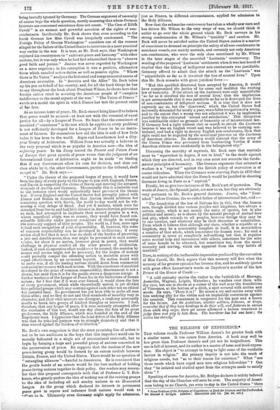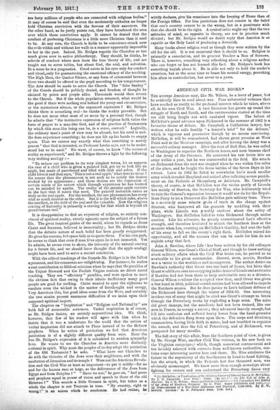THE RELIGION OF EXPERIENCE.*
Tuts volume recalls Professor William James's far greater book with a similar name. It too comes from America. A book may well be less great than Professor James's and yet not bo insignificant. This one is full of interest, and its author is a master of terse and lucid expres- sion. His object is " to attempt to bring to light some of the verifiable factors in religion." His primary inquiry is not into the truth of religious creeds, but " as to their reason for existence." What " are those needs which have urged men into religious fellowships " ? Can they " be isolated and studied apart from the attempts made to satisfy them " ?
Speaking of course for America, Mr. Bridges declares it widely believed that the day of the Churches will soon be over. The majority of Ameri- cans belong to no Church, yet even to-day in the United States " there
• songs Outlines of the Religion of Zsperience: a Book for Laymen and the Unc.hurchal. Dr Home J. Bridges. i.ondon: Macmillan and Co. pie. ad. wit.1
are forty millions of people who are connected with religions bodies." It may of course be said that even the moderately orthodox no longer bold Christian conviction with the fervour of their ancestors. On the other hand, as he justly points out, they have broadened the area over which those convictions apply. It cannot be denied that the conduct of professing Christians is a little more Christian than it used
to be. At any rate, the Church is liable to be conscience-struck over the evils within and without her walls in a manner apparently impossible
to her in the past. Indeed. Mr. Bridges regards the Churches as too much given over to active philanthropy. They should, he thinks, be schools of conduct where men learn the true theory of life, and are taught not to serve tables, but about God, the soul, and salvation. In a sense he is a pragmatist. Creed exists in his eyes only for conduct and ritual,.only for guaranteeing the emotional efficacy of the teaching The High Mass, the Quaker Silence, or any form of ceremonial between these two should be offered to the pupil according to his temperament.
The Arts should be made to serve the Church. The " false finality " of the Creeds should be publicly denied, and freedom of thought be claimed by priest and people alike. Thousands would then return to the Church. But if the whole population returned, what would be the good if there were nothing real behind the pomp and circumstance, or the mysterious silence, or the organized aspiration ? Mr. Bridges thinks there is something real—he thinks the reality provable. But he does not mean what most of us mean by a personal God, though he admits that " the instinctive expression of religious faith takes the form of prayer to a man-like God, and of the practice of Sacraments by which this man-like being can be, in a sense, coerced." Logically, the ordinary man's point of view may ho absurd, but his need is met.
Ho does experience something ; he does not lift up his hands to empty space. That we cannot say exactly what that something is merely proves " that God is intended, as Professor Leuba says, not to be under- stood but to be used." We want, of course, to know " the nature of reality as experienced," and Mr. Bridges throws a light by the following very striking analogy :- " To reduce our problem to its very simplest terms, let us suppose the ease of a child who is given a painted ball, got up to look like an apple, but made of pasteboard and filled with dust and ashes. If the child bites it and then says, This is not a real apple,' what does he mean ? He means that tho phenomenon is not such as to satisfy the desires evoked by its appearance ; and those desires are the expression of
certain needs of his nature which through experience he has learned can be satisfied by apples. The reality of the eenuine apple consists in the fact that it meets this need. The painted imitation exists as
truly as the real apple. For the intellect, the one phenomenon has every whit as much interest as the other. But it is the will which rules, above
the intellect, in the field of the real and the valuable. Now the religious craving of humanity is primarily a craving for that which is beyond all peradventure real.'
It is disappointhre to find an exponent of religion, so entirely con- vinced of spiritual reality, utterly agnostic upon the subject of a future
life. The great inspired guides of the world, whom he regards as Jesus
Christ and Socrates, believed in immortality ; but Mr. Bridges thinks that the definite nature of such belief has been greatly exaggerated.
He gives his reasons, but space fails us to quote them. For his own part, be seems to think that even if man lives again he is not immortal. Yet he admits, he seems even to share, the intensity of the natural craving for a future life, and we should have thought that the apple analogy might have been used to serve a second conclusion.
With the ethical teachings of the Gospels Mr. Bridges is in the fullest agreement, and his comments are enlightening. For instance, he makes a real contribution to Biblical criticism when he says that the parables of
the Unjust Steward and the Foolish Virgins contain no direct moral teaching. They are " efficiency " parables, and were spoken to meet
the obvious fact that owing to their idiotio inefficiency many good
people are good for nothing. Christ wanted to spur the righteous to emulate oven the wicked in the matter of forethought and energy,
Very American this, but good ideas come from the West, and certainly the two stories present enormous difficulties if we insist upon their supposed spiritual import.
The chapters on "Inspiration" and "Religion and Nationally" are both full of memorable sentences. Verbal inspiration is of course, as Mr. Bridges insists, an entirely superstitious idea. Wo think, however, that few of his readers will agree with him when he insists that it was a misfortune for the world that the notion of verbal inspiration did not attach to Plato instead of to the Hebrew prophets. When he writes of patriotism we feel that American patriotism is of a slightly different quality from ours. None the less Mr. Bridges's expression of it is calculated to awaken sympathy hero. He wants to see the Churches in America more distinctly national in spirit. Why must the peoples of to-day adopt the patriotism of the Old Testament ? he Deka. " What have our Churches to do with the victories of the Jews over their neighbours, and with the exaltation of Jerusalem and its temple ? Were not the American Revolu- tion and the Civil War at least as important—to put it mildly—for us and for the human race at large, as the deliverance of the Jews from Egypt and from Babylon ? " " Have we not," he goes on, " had poets and prophets equal in power of vision and speech to those of the old Hebrews 1 " This sounda a little German in spirit, but taken as a whole the chapter is not Teutonic+ in tone. " My country, right or wrong I" is an axiom which he condemns. „He had • rather, he
wittily declares, give his conscience into the keeping of Rome than of the Foreign Office. For him patriotism does not consist in the belief that one's country cannot be in the wrong, but in a passionate wish that she should be in the right. A cynical critic might say that the two attitudes of mind, so opposite in theory, are not in practice much divided ; but Mr. Bridges would no doubt reply that America is as capable as the Hely Land of producing a Jeremiah.
Many books about religion read as though they were written by the old for the old. It is not unnatural that it should be so. Religion is primarily a consolation, and its greatest Teacher a Man of Sorrows. There is, however, something very refreshing about a religious author who can forget or has not learned this fact. Mr. Bridges's book has something boyish about it. He is able not only to hold the reader's attention, but at the same time to brace his mental energy, provoking him often to contradiction, but never to a yawn.



































 Previous page
Previous page